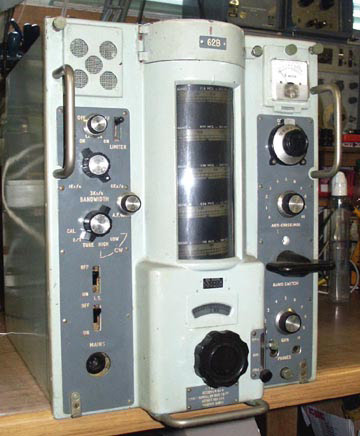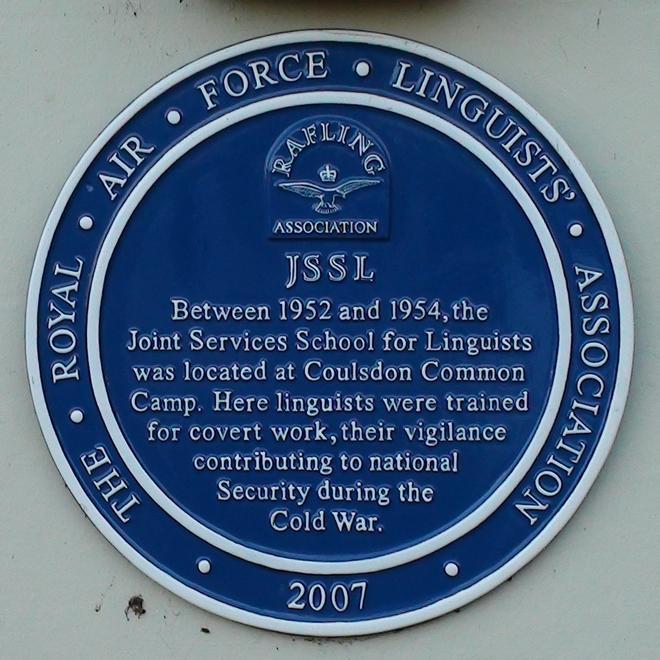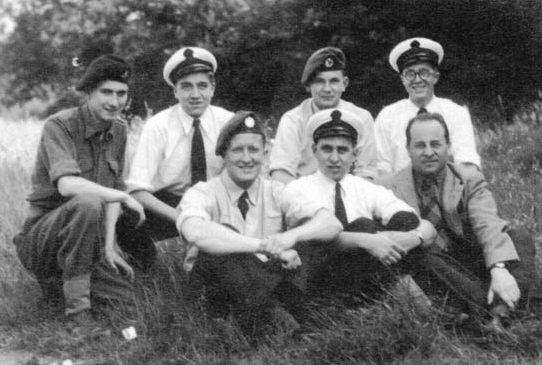| Listening to the Russians |
| First Published in
East-West Review Summer 2012 and reproduced with permission ISSN
1759-863X Vol. 11, no. 2 ISSUE 30 The author is Dennis Mills. The images are supplied by me from the internet |
 B40 |
| Readers may have seen the late Jack Rosenthal’s TV play Bye Bye Baby, a Paravision Production on Channel Four in 1992, a fictional work, nevertheless showing with great authenticity the work of the Royal Navy’s ‘coders (special)’ in Germany in the 1950s. Jack was a coder special himself. Hamish Baillie, a leading coder special, monitored Soviet radio traffic at HMS Royal Albert, the shore station in Cuxhaven. As leading hand of his watch, he was probably logging a signal from the Soviet admiralty in Leningrad, which at one time would have started off with ‘Ya Krokodil’ (I’m Crocodile – his call sign or radio identity). The whole Soviet fleet would be listening carefully for its orders. |
| In the remainder of the watchroom there would have been upwards of fifteen other Russian-speaking operators, each with two radio sets and a Ferrograph tape recorder, the latter then quite new and state-of-the-art. They too would have been leading coders with badges that barely gave cover to the branch’s name, ‘special’ in the armed services generally referring to ‘intelligence work’. These men and their counterparts in the Army and RAF were on loan to GCHQ (Government C o m m u n i c a t i o n s HQ), which allocated wavelengths used by the Soviet armed services (land, sea and air), the predecessor of the KGB, and the diplomatic service. |
| The story started in 1948 with a decision in principle at Cabinet level, following a recommendation by the Joint Intelligence Committee (JIC) to the Chiefs of Staff (COS). There followed nearly three years of detailed planning at the level of the JIC, the COS, the Ministry of Defence, the Ministry of Labour and National Service (MLNS), and the three armed service departments working in collaboration. The JIC solution to the problem of finding enough recruits to fulfil the requirements of the services in time of war came in a Top Secret document of 19 March 1951. Even then there was still much further debate in official quarters, as well as hesitation, confusion, and in the end great haste, with the first men being recruited in the summer of that year. |
| It involved many haphazard decisions in national service registration centres affecting about 4,000-plus individual national servicemen of all three services over a period of nine years, 1951 to 1959. All this and much more can now be read in the Admiralty collection at the National Archives. The perceived Soviet threat focused government thinking on the tiny number of Russian speakers in Britain. The employment of large numbers of aliens from eastern Europe was considered as a possible source of signals intelligence monitors. Many had a good standard of Russian and a known antipathy towards the communist regime, but security considerations eventually led the JIC to reject the proposal. Instead, national service recruits provided a large pool of relatively well-educated young men, many with an A level or two in foreign languages. The two-year term of national service coming into effect in January 1950 made possible a sufficiently long period of training, followed by a useful spell of active duty. |
| However, identifying precisely which young men to send on a Russian course taxed the authorities considerably. For instance, they had to publicize their needs without broadcasting the fact to the Russians, known to be touchy about Western servicemen studying their language. The MLNS agreed to brief all national service registration centres so that potential Russian linguists might be identified when they first turned up. Staff in these centres did not always heed the briefing; some may simply never have come across it. The Navy had an additional problem because it was generally assumed that it took no national servicemen. In fact it had a quota of about 2,500 a year, less than two per cent of the total conscripted, and most of the places were already earmarked for special categories. |
| In a survey of sixty former coders, fifty-two had put the Navy down as a preference, more in hope than expectation. This often brought the response that only those good enough at languages to learn Russian could hope to be accepted. Those who surmounted this hurdle were guaranteed places at language school, something the other two services were unable, or at least usually unwilling, to do. Only after you had joined the Army or RAF was it possible to seek a place on a Russian course. The survey has also revealed that twenty-seven coders had a significant knowledge of the Navy often through their families; nine had been in a Sea Cadet Corps, three in the Sea Scouts and seven in the Royal Naval Volunteer Reserve. Thirty-five already knew something about the Joint Services Schools for Languages (JSSLs) before they went to their national service centre, having heard about them from school friends or staff, within the family, or ‘on the grapevine’. A few learned about the Russian course by seeing a notice in their centre asking if anyone wanted to be considered for it. The great majority of recruits were straight from sixth forms – forty-four compared with eight recent graduates and eight coming from work. Twenty-two of the sixty were sent by their national service centres to other venues for further assessment. Usually it involved a trip to Portsmouth for intelligence and aptitude tests and an interview with an officer, in many cases women officers pretty and smart enough to put a young chap off his stroke. We cannot now distinguish any obvious reason why some went to Portsmouth and others did not. Nevertheless, the Navy, the smallest of the three services, recruited a roughly equal share of Russian linguists and they acquitted themselves well on the courses. |
 |
| From early days a difference of function was recognized between interpreters (who might be needed to interrogate prisoners of war) and translators. As the latter did little formal translation after training, ‘translator’ was probably partly a cover for special duties as radio operators. They were trained at three service-run schools, JSSL Bodmin opening in a disused Army camp on 1 October 1951 and JSSL Coulsdon Common, near Croydon, in a similar camp in February 1952. Coulsdon closed in August 1954, all new coders then proceeding to Bodmin. In April 1956 Bodmin closed and all staff and students moved to Crail, a former RN Air Service station ten miles south of St Andrews which in turn closed in March 1960 as national service came to an end. These camps were anomalous places in terms of service organization, with the Army running them on behalf of all three services, which accounts for Navy coders at Coulsdon wearing Army gaiters and taking their books to lessons in army satchels. It should be said, however, that it was the RAF which spearheaded the academic organisation of the service JSSLs, already having run a small school for the same purpose at RAF Kidbrooke for several years, service schools held first progress tests after six to eight weeks of a course, students with marks over a certain threshold being transferred to university courses for interpreters at JSSL London for the Navy and some RAF students, JSSL Cambridge for the Army and RAF. |
 1953. The instructor was a Ukrainian |
| Would-be Navy interpreters also went before an Admiralty Interview Board, and if successful were commissioned as midshipmen; if not, they remained as coders. About fifteen percent of Navy students were doubly successful, whereas the single test for the other two services yielded a transfer rate of perhaps twenty-five per cent or more. For most of the intakes, the courses at the service schools lasted nine to eleven months, often long enough for students to get well beyond A-level standard. Later intakes had basic courses limited to seven months taken by all students and used for diagnostic purposes to identify men with good enough results to go on to interpreter courses. Navy students still had to pass an Interview Board, but were not commissioned unless they completed their interpreter course successfully. |
| At JSSL most of the time was occupied in grammar classes of about two dozen students, alternating with oral classes of about eight, during which all conversation, reading aloud, and pronunciation and dictation exercises were conducted in Russian. For some intakes, this regime was complemented by lectures from the tutors, in Russian from the first week. Instructors were mostly from eastern Europe and told us about their often harrowing experiences – for example, Whites fleeing from Reds during the revolutionary period. Nevertheless, there was no attempt on their part, or that of the authorities, to indoctrinate us one way or the other. In early intakes, there were frequent screenings of Soviet films, many, but not all, execrable. Singing classes often added further variety to the curriculum and introduced us to popular Russian and Soviet songs. It was total immersion, apart from ‘light relief ’ in the form of physical education; route marches and some infantry training; keeping our barrack huts in an acceptable state and mounting guard on the coke store and other ‘strategic assets’. Although planning estimates of ‘wastage’ were as high as thirty per cent, with the exception of one early intake, few coders were turned off the course and transferred to another branch, such as the coder educational branch (teachers of basic subjects) – the possibility of becoming a stoker mechanic was a potent ‘stick’ to beat us with. The privilege of studying something useful during our national service was a very effective ‘carrot’, an experience that was going to bulk large in our memories, and for some to have a major impact on future careers. |
| It was not all work and no play, as there was a rich cultural life in our spare time, despite the homework. Jazz was very popular with one Coulsdon intake, cross country running with another. At Christmas 1953 the choir recorded on vinyl a concert that included a Russian carol. Two successive intakes put on a play at RAF Wythall, taking advantage of the presence of Leading Coder Bill Slater, a RADA alumnus and a future BBC drama producer. On a day-to-day basis in our barrack huts there was lively repartee and mild banter; and tolerance for a wide range of religious and political viewpoints. After completing the Russian course, coders were promoted to leading coder, the equivalent of a corporal in the other services. We signed the Official Secrets Act and thought that we and our families had been vetted. Then followed three months alongside RAF colleagues being trained to intercept Russian radio traffic. Early intakes went to RAF Wythall near Birmingham, later ones to RAF Pucklechurch (Gloucestershire). A little radio theory and some military Russian accompanied the main business of logging genuine Russian radio traffic from practice tapes. Static and other interference was introduced as we got more proficient. My class even played tombola (now known as bingo) in Russian. This was to help us with numbers, as a large amount of the practice traffic was enciphered. Either before JSSL or after radio school it was expected that coders would do a little cryptography, although using a code book outside the classroom was a rare event. There was also ‘sea time’ of a few weeks, even two to three months, although it was a lottery that led to some staying in dry dock the whole time, whilst Arnold Bell was in a cruiser rammed by a Daring class destroyer. |
| Coders did their eavesdropping in ‘Y’ stations, first at HMS Royal Albert at Cuxhaven, later at HMS Royal Charlotte near Kiel. Fortunate coders listened to plain language messages, but, as most signals were enciphered, many boring hours were spent logging four-digit groups line after line. Occasionally there would be some excitement, such as when a pilot got an ‘ear-bashing’ for singing a proper socialist song with his microphone switched on. Gerald Seaman remembers hearing one signal that sounded as if it was sent by a pilot whose aircraft immediately crashed. Message pads and recorder tapes went to GCHQ for analysis, some information going ahead each day by teleprinter. Towards the end of the decade, coders transcribed messages before they were sent off, using tape recordings to improve what had been logged as it was first heard. As GCHQ received recordings and logs from a number of similar ‘Y’ stations, it could make comparisons to get the best version possible. Direction finding bearings from a number of stations fixed the positions of the Soviet units generating the traffic. Alan Walker recalls monitoring what was known to be the cruiser Sverdlov, whose call sign in 1953 was ‘Chyot22’, and from 1954 Bill Musker recalls serious times in the watchroom when network frequencies and call signs changed unexpectedly. |
| He says they prided
themselves on recognising, more rapidly than their US partners in
Bremerhaven, old friends like ‘Kryuchnik’ and ‘Sledopyt’, whose voices
they had grown accustomed to. Mistakes by operators could also indicate
changes of call signs. Occasionally one of the two ex-Kreigsmarine
Schnellboote were used to take coders and telegraphists special out in
the Baltic to collect intercepts from Soviet naval ships. They were
capable of over 50 knots - useful for quick get-aways – but the aerials
would have been evidence of their purpose. Those who went on such trips
included the late Gordon Clough (one-time BBC radio presenter), as well
as Arnold Bell and Anthony Camacho, who recall that they seldom knew
where in the Baltic they went, because ‘they did not need to know’. A few coders did their watchkeeping elsewhere than in Germany, some in Cyprus during 1955 and 1956, some on the coast of northern Turkey in 1956-57, two or three in Hong Kong, and a group of sixteen went on a NATO naval exercise in the Mediterranean to monitor the radio silence that was part of the war game rules. |
| Peter Lord
and Kit Lambert were members of a party of five coders in Cyprus during
1956, with palm and orange trees as part of their everyday outlook.
Peter recalls that the camp probably had thirty to forty listening
stations, half manned by Americans. They had a choice of four aerials
and a fair amount of freedom to range across frequencies, although their
main objective was to capture Soviet Navy radio traffic from the Black
Sea. Much of this was connected with low-key exercises, basically live
plain language interaction between ships. It was always interesting and
they learned some Russian swear words. The most dramatic incident was a
near collision between (they reckoned) a destroyer and a submarine. Many of us were doubtful of the value of our work because we were never given the slightest briefing that would have convinced us otherwise. There were other grievances, such as having to do menial work, sometimes pointless, in off-watch hours, when, like our RAF counterparts, we might have ‘got our heads down’. ‘Go-slows’ occurred; coders simply stopped hearing Russian voices, causing officers to worry lest the Soviets had declared ‘radio silence’, an anticipated precursor to war. Robin Pearce also recalled a serious infringement of discipline in the watchroom in 1955. An unfortunate coder had repeatedly refused an order to ‘swing’, that is, to search on a prescribed frequency range. This probably occurred in the small hours when there was little traffic and coders commonly broke the rules and listened to music on civilian stations. The offence was regarded as a refusal to act on the order of a superior officer. This led to the coder being reduced to ‘able’ rate, with a consequent proportionate loss of pay for the remaining weeks of his service. To underline all ratings mustered to witness the punishment being meted out, which also included the ceremonial ripping of his leading hand’s badge from his sleeve. |
| Professor Richard Aldrich, a specialist in intelligence history, has recently told us that monitoring was a useful part of the West’s defence strategy in that it helped GCHQ to keep track of the Russian order of battle, in addition to what was being discovered through agents on the ground behind the Iron Curtain. Changes of call signs and D/F (direction finding) bearings gave away ship, troop and aircraft movements, thus making it less likely that we would have been taken by surprise if an attack had occurred. And by the way, the JIC on 19 March 1951 had suggested that one third of us should be ‘Wrens’ (members of the Women’s Royal Naval Service), since women are better at languages than men. Pity the JIC lost the argument, but the Admiralty had good practical reasons for not accepting the JIC proposal. Firstly, Wrens had no reserve commitment in their contracts and the authorities’ priority was above all to create a reserve of Russian speakers in case of war. Secondly, if war had broken out, about eighty per cent or more of us would have gone to the Fleet to intercept mostly plain language radio traffic - tactical messages from Soviet ships with immediate action required - and Wrens did not normally go to sea. |
|
http://www.amazon.co.uk/s/ref=nb_sb_noss?url=search-alias%3Daps&field-keywords=The+Coder+Special+Archive
The Coder Special Archive by Tony Cash & Mike Gerrard. |
| Dennis Mills, ‘JSSL
1951-60. National Servicemen preparing for war as Russian
linguists’ which can be found at: http://www. |